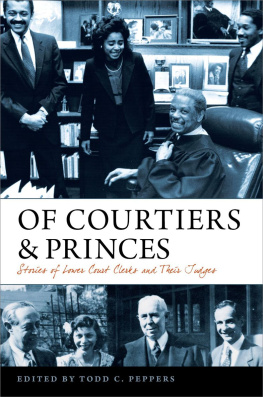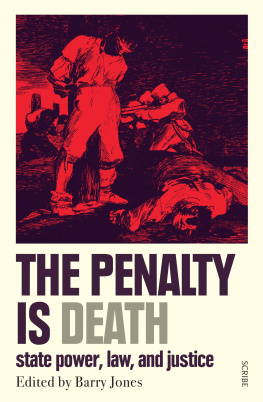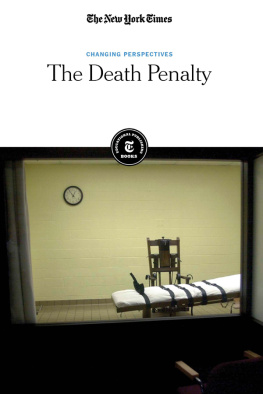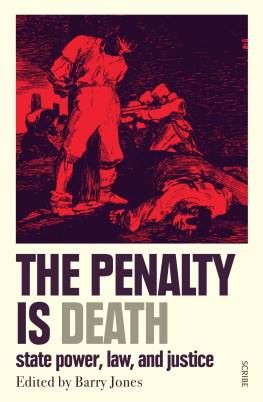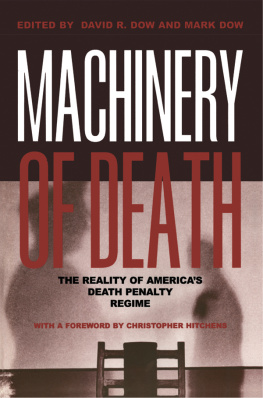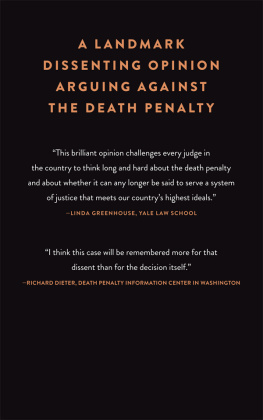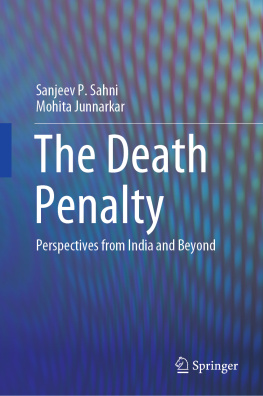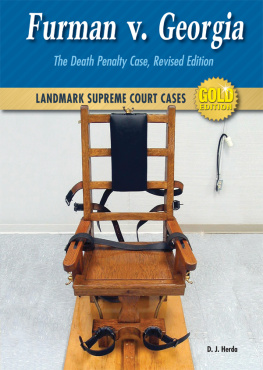2017 by Vanderbilt University Press
Nashville, Tennessee 37235
All rights reserved
First printing 2017
This book is printed on acid-free paper.
Manufactured in the United States of America
Cover design by Rich Hendel
Composition by Dariel Mayer
Library of Congress Cataloging-in-Publication Data on file
LC control number 2016042799
LC classification number KF9227.C2 P45 2017
Dewey classification number 364.66092 [B]dc23
LC record available at lccn.loc.gov/2016042799
ISBN 978-0-8265-2160-6 (hardcover)
ISBN 978-0-8265-2161-3 (paperback)
ISBN 978-0-8265-2162-0 (ebook)
Foreword
But for Marie McFadden Deans, my life would have ended in a dank prison basement on 22 February 1991, fried at the hands of the Commonwealth of Virginia. That is not to say that there were not many other human beings, all deserving of their own books, who jumped in to help stay the executioners cold hands. There are many unsung heroes responsible for my being alive to write these words. The reality is that, but for Marie Deans, those other heroes would not have come together on my behalf. No matter how my story gets spun, no one can deny that Marie was the force and linchpin that kept my case, and ultimately me, alive. She was the force right up to the moment she drew her last breath, and she remains that force and linchpin even in death.
Marie was an uncompromising abolitionist. In her eyes, killing was wrong. State sanctioned killing was just that: wrong. As uncompromising as she was on the issue of capital punishment, there was one thing that Marie was not. She was not a namby-pamby bleeding heart who was soft on crime or criminals. I personally knew murderers, rapists, and robbers who dreaded encountering Marie. They knew, as I did, that she was not in the least tolerant of rationalizing, excuse making, whining, and woe is me crap. Marie demanded, without exception, that each one of us accept and take responsibility for our lives and our actions. Even the guards and some wardens grasped that Marie would brook no nonsense from her guys, and they were not above telling various inmates, [When] Ms. Deans visits again Ill fill her in on what youve been doing. More often than not, the individual in question would cool his heels, including me. I recall that shortly after I left the death house, while at Augusta Correctional Center, I was getting into some things I should not have been getting into. I was summoned to the buildings breezeway and was confronted by Major Daniel Braxton. He said, Knock it off. Do not make me place a call to Marie and Mike Farrell and let them know... This attained the desired effect.
Marie insisted that we reflect on ourselves and that we work to educate ourselves; she expected that we ask her how we might be of help or service to others, instead of always expecting others to help us. She demanded that we make ourselves better human beings and better citizens, and she expected us to be that whether on or off death row, in or out of prison. And more, she demanded that we treat each and every individual we encounteredwithout exceptionwith respect and dignity. That included our executioners. For Marie, it wasnt us versus them; it was just us, all of us.
Colman McCarthy, a former syndicated columnist for the Washington Post and founder of the Center for Teaching Peace, once referred to Marie as being a saint. Marie, puffing on a cigarette, bristled and snapped, Im no goddamned saint. I agreed with Colman but defined what I meant by saint: a sinner who pulls herself back up when she falls and keeps moving. I still got a withering look from her, but I didnt get hit with any nearby objects. Marie is gone now, so I feel safe referring to her as a saint, with one caveat. Ambrose Bierce defined a saint as a dead sinner revised and edited. Marie, like us all, would require a great deal of editing. Marie could be damned difficult at times. She could, and did, push hard on her friends, and she could be unforgiving if you fell short of her sometimes unrealistic standards. She could have a very sharp tongue. Marie was driven. She would make personal sacrifices that others, even I, would not necessarily make. She hurt the feelings of more than a few of her friends, and even alienated some. I know Marie quite well, and Im certain that she would be the first to say, Dont revise or edit; I am no saint.
One bit I would not edit is this. Once, after Marie spent two hours on the witness stand during a civil trial to determine whether the state had a duty to provide lawyers to those it was planning to execute, the late Federal District Court Judge Robert Merhige stated, The world could use a thousand more Maries. What the judge, and others, did not know when he made that statement was that, immediately after testifying, Marie had to admit herself to a hospital to have a large tumor removed. Her doctors had wanted to do the surgery a couple of weeks earlier, but Marie had kept that secret from everyone because she knew that her testimony was crucial to winning the case. As she put it to me, she wasnt going to let a silly tumor screw that up. I dont know if that qualifies her for sainthood or not, but I believe that, of all the players involved in that case, including me, Marie is likely the only one who would have taken such a personal risk.
US Court of Appeals Judge Kenneth K. Hall once said of Marie, The Commonwealth of Virginia has failed in its constitutional duty to provide those it has sentenced to death with adequate and meaningful access to the courts and has, instead, relied on Marie Deans, a private citizen, to carry out their constitutional responsibility. At the time Judge Hall was considered one of the most conservative judges sitting on the bench.
In a letter I sent to the Virginia Parole Board in 2004, I described Marie as being akin to both Socrates and Jesus in the role she played and the effect she had on my life. Marie did far more than work tirelessly to save my life and the lives of those others on death row with me. She pushed on us to learn, to question, to grow. She taught me about empathy, compassion, forgiveness, responsibility, and about what it means to be a good citizen and human being. She insisted that I seek out and discover my own answers to those large existential questions. At times she pushed with tears of reluctance and deep gentleness, at other times with careful analysis, still at other times with fierce fire and angry wisdom. Sometimes she would be quiet and not correct me to remind me of a point made by Sren Kierkegaard (just one of the great minds she introduced me to) that only by investing and speaking ones vision with passion, will the truth, one way or another, finally penetrate the complacency of the world. Marie, in that sense, took all of Kierkegaards writings to heart, and the cost to her was heavy.
For all who knew her, Marie was a force to be reckoned with. Whether she was a saint or not makes no difference to me. For me, Marie will always be my friend and hero. I hope in the pages that follow you will be able to catch at least a small glimpse of the Marie Deans that I knew and loved.


